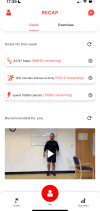Feasibility study of rehabilitation for cardiac patients aided by an artificial intelligence web-based programme: a randomised controlled trial (RECAP trial)-a study protocol
- PMID: 38688664
- PMCID: PMC11086203
- DOI: 10.1136/bmjopen-2023-079404
Feasibility study of rehabilitation for cardiac patients aided by an artificial intelligence web-based programme: a randomised controlled trial (RECAP trial)-a study protocol
Abstract
Introduction: Cardiac rehabilitation (CR) delivered by rehabilitation specialists in a healthcare setting is effective in improving functional capacity and reducing readmission rates after cardiac surgery. It is also associated with a reduction in cardiac mortality and recurrent myocardial infarction. This trial assesses the feasibility of a home-based CR programme delivered using a mobile application (app).
Methods: The Rehabilitation through Exercise prescription for Cardiac patients using an Artificial intelligence web-based Programme (RECAP) randomised controlled feasibility trial is a single-centre prospective study, in which patients will be allocated on a 1:1 ratio to a home-based CR programme delivered using a mobile app with accelerometers or standard hospital-based rehabilitation classes. The home-based CR programme will employ artificial intelligence to prescribe exercise goals to the participants on a weekly basis. The trial will recruit 70 patients in total. The primary objectives are to evaluate participant recruitment and dropout rates, assess the feasibility of randomisation, determine acceptability to participants and staff, assess the rates of potential outcome measures and determine hospital resource allocation to inform the design of a larger randomised controlled trial for clinical efficacy and health economic evaluation. Secondary objectives include evaluation of health-related quality of life and 6 minute walk distance.
Ethics and dissemination: RECAP trial received a favourable outcome from the Berkshire research ethics committee in September 2022 (IRAS 315483).Trial results will be made available through publication in peer-reviewed journals and presented at relevant scientific meetings.
Trial registration number: ISRCTN97352737.
Keywords: Cardiac surgery; Cardiology; Cardiothoracic surgery; REHABILITATION MEDICINE.
© Author(s) (or their employer(s)) 2024. Re-use permitted under CC BY-NC. No commercial re-use. See rights and permissions. Published by BMJ.
Conflict of interest statement
Competing interests: None declared.
Figures
Similar articles
-
Rehabilitation Exercise and psycholoGical support After covid-19 InfectioN' (REGAIN): a structured summary of a study protocol for a randomised controlled trial.Trials. 2021 Jan 6;22(1):8. doi: 10.1186/s13063-020-04978-9. Trials. 2021. PMID: 33407804 Free PMC article.
-
Cardiac rehabilitation for children and young people (CardioActive): protocol for a single-blind randomised feasibility and acceptability study of a centre-based cardiac rehabilitation programme versus usual care in 11-16 years with heart conditions.BMJ Open. 2024 Feb 24;14(2):e077958. doi: 10.1136/bmjopen-2023-077958. BMJ Open. 2024. PMID: 38401897 Free PMC article.
-
Mobile health biometrics to prescribe immediate remote physical activity for enhancing uptake to cardiac rehabilitation (MOTIVATE-CR+): protocol for a randomised controlled feasibility trial.BMJ Open. 2024 Feb 12;14(2):e076734. doi: 10.1136/bmjopen-2023-076734. BMJ Open. 2024. PMID: 38346877 Free PMC article.
-
Interventions to promote patient utilisation of cardiac rehabilitation.Cochrane Database Syst Rev. 2019 Feb 1;2(2):CD007131. doi: 10.1002/14651858.CD007131.pub4. Cochrane Database Syst Rev. 2019. PMID: 30706942 Free PMC article.
-
Exercise-based cardiac rehabilitation for adult patients with an implantable cardioverter defibrillator.Cochrane Database Syst Rev. 2019 Feb 12;2(2):CD011828. doi: 10.1002/14651858.CD011828.pub2. Cochrane Database Syst Rev. 2019. PMID: 30746679 Free PMC article.
Cited by
-
From surgery to recovery: Measuring success through quality of life and functional improvements after cardiac surgery.World J Cardiol. 2025 Feb 26;17(2):100213. doi: 10.4330/wjc.v17.i2.100213. World J Cardiol. 2025. PMID: 40061280 Free PMC article.
-
Predictive Prognostic Factors in Non-Calcific Supraspinatus Tendinopathy Treated with Focused Extracorporeal Shock Wave Therapy: An Artificial Neural Network Approach.Life (Basel). 2024 May 25;14(6):681. doi: 10.3390/life14060681. Life (Basel). 2024. PMID: 38929665 Free PMC article.
-
The Big Data Era in Cardiology and Cardiovascular Medicine: Advanced Analytics for Truly Personalized Care.Diagnostics (Basel). 2025 Jul 3;15(13):1705. doi: 10.3390/diagnostics15131705. Diagnostics (Basel). 2025. PMID: 40647704 Free PMC article.
-
Artificial intelligence in personalized rehabilitation: current applications and a SWOT analysis.Front Digit Health. 2025 Jul 24;7:1606088. doi: 10.3389/fdgth.2025.1606088. eCollection 2025. Front Digit Health. 2025. PMID: 40778384 Free PMC article. Review.
References
-
- Freene N, McManus M, Mair T, et al. . Association of device-measured physical activity and sedentary behaviour with cardiovascular risk factors, health-related quality-of-life and exercise capacity over 12-months in cardiac rehabilitation attendees with coronary heart disease. BMC Sports Sci Med Rehabil 2022;14:169. 10.1186/s13102-022-00562-7 - DOI - PMC - PubMed
Publication types
MeSH terms
Associated data
LinkOut - more resources
Full Text Sources
Medical




